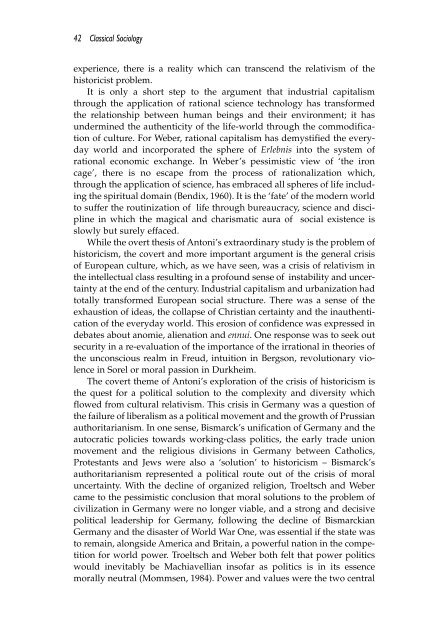You also want an ePaper? Increase the reach of your titles
YUMPU automatically turns print PDFs into web optimized ePapers that Google loves.
42 <strong>Classical</strong> <strong>Sociology</strong><br />
experience, there is a reality which can transcend the relativism of the<br />
historicist problem.<br />
It is only a short step to the argument that industrial capitalism<br />
through the application of rational science technology has transformed<br />
the relationship between human beings and their environment; it has<br />
undermined the authenticity of the life-world through the commodification<br />
of culture. For Weber, rational capitalism has demystified the everyday<br />
world and incorporated the sphere of Erlebnis into the system of<br />
rational economic exchange. In Weber’s pessimistic view of ‘the iron<br />
cage’, there is no escape from the process of rationalization which,<br />
through the application of science, has embraced all spheres of life including<br />
the spiritual domain (Bendix, 1960). It is the ‘fate’ of the modern world<br />
to suffer the routinization of life through bureaucracy, science and discipline<br />
in which the magical and charismatic aura of social existence is<br />
slowly but surely effaced.<br />
While the overt thesis of Antoni’s extraordinary study is the problem of<br />
historicism, the covert and more important argument is the general crisis<br />
of European culture, which, as we have seen, was a crisis of relativism in<br />
the intellectual class resulting in a profound sense of instability and uncertainty<br />
at the end of the century. Industrial capitalism and urbanization had<br />
totally transformed European social structure. There was a sense of the<br />
exhaustion of ideas, the collapse of Christian certainty and the inauthentication<br />
of the everyday world. This erosion of confidence was expressed in<br />
debates about anomie, alienation and ennui. One response was to seek out<br />
security in a re-evaluation of the importance of the irrational in theories of<br />
the unconscious realm in Freud, intuition in Bergson, revolutionary violence<br />
in Sorel or moral passion in Durkheim.<br />
The covert theme of Antoni’s exploration of the crisis of historicism is<br />
the quest for a political solution to the complexity and diversity which<br />
flowed from cultural relativism. This crisis in Germany was a question of<br />
the failure of liberalism as a political movement and the growth of Prussian<br />
authoritarianism. In one sense, Bismarck’s unification of Germany and the<br />
autocratic policies towards working-class politics, the early trade union<br />
movement and the religious divisions in Germany between Catholics,<br />
Protestants and Jews were also a ‘solution’ to historicism – Bismarck’s<br />
authoritarianism represented a political route out of the crisis of moral<br />
uncertainty. With the decline of organized religion, Troeltsch and Weber<br />
came to the pessimistic conclusion that moral solutions to the problem of<br />
civilization in Germany were no longer viable, and a strong and decisive<br />
political leadership for Germany, following the decline of Bismarckian<br />
Germany and the disaster of World War One, was essential if the state was<br />
to remain, alongside America and Britain, a powerful nation in the competition<br />
for world power. Troeltsch and Weber both felt that power politics<br />
would inevitably be Machiavellian insofar as politics is in its essence<br />
morally neutral (Mommsen, 1984). Power and values were the two central

















